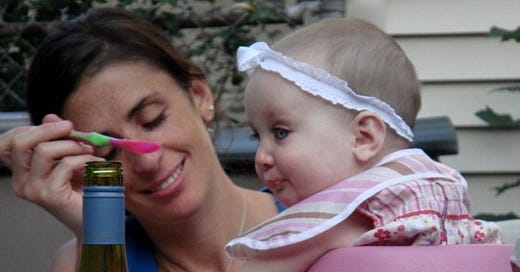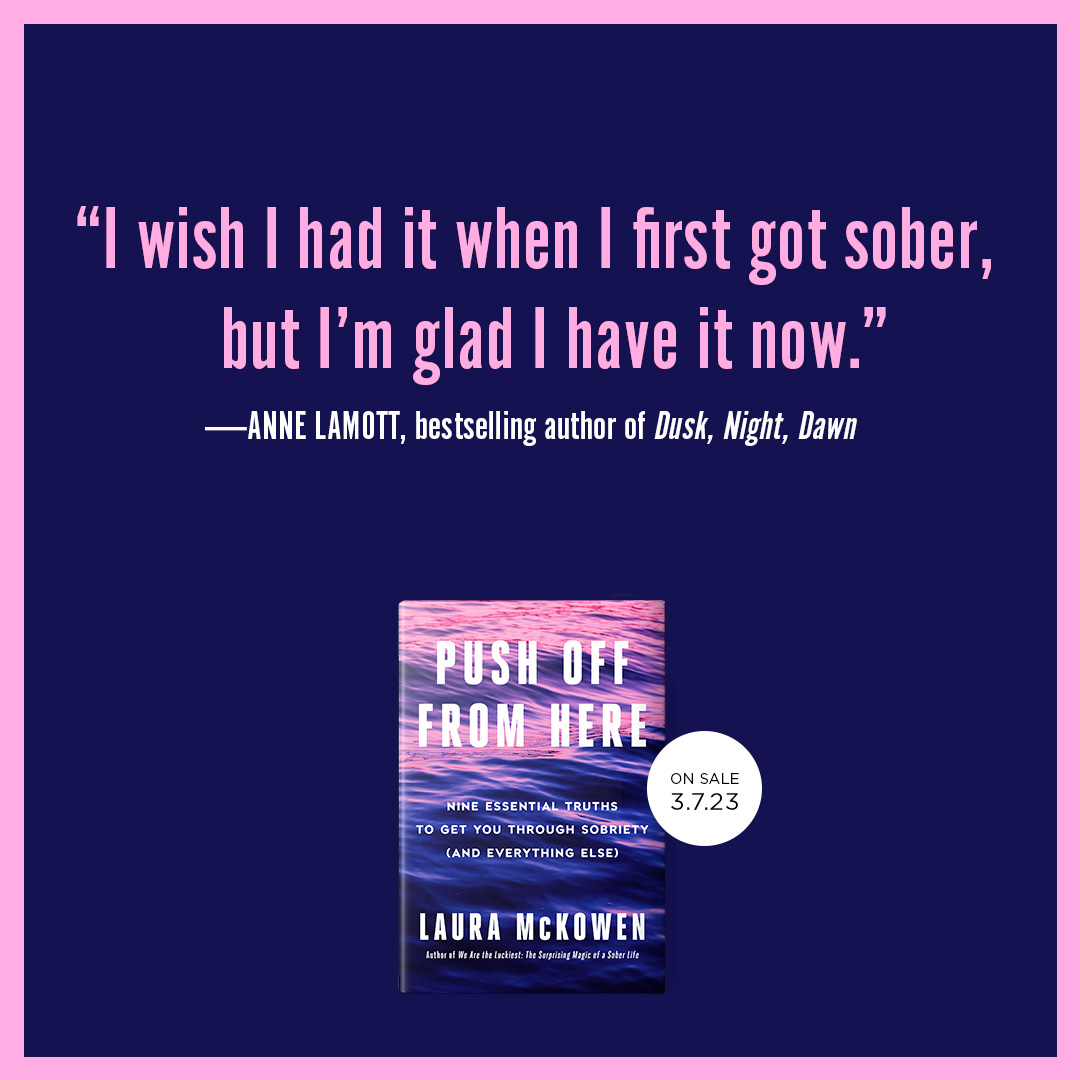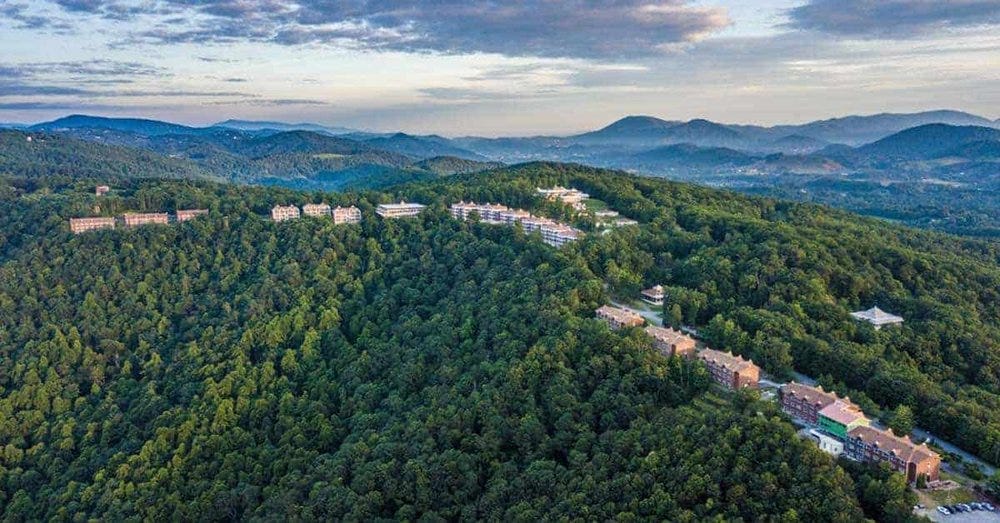A version of this piece was originally published on LauraMcKowen.com in 2018. It’s been updated here with new resources & commentary.
When I think about the worst part of my drinking, it’s not the blackouts, the DUI, the toxic hangovers, or even the body-cringing moments involving my daughter that grip me the most. It’s the anxiety.
That ten-ton plank on my chest. The racing, dislocated thoughts. The scramble to find ground, any ground, as my heart slammed against my ribcage—often for days after. The ice water feeling in my veins.
In the end, that’s what finally did me in. When I woke up with my last hangover, I thought I won’t survive feeling this again. It will kill me.
It wasn’t just like this at the end of my drinking, though.
In hindsight, I’d been anxious all my life. I often joke that my girl cat, Piper, and I have the same nervous system. She’s jumpy as fuck, startles easily, and is generally always on alert as a default. She doesn’t like being surprised or scared (ask my daughter how murderous I get when she scares me on purpose). I don’t remember a time when I wasn’t like this. Alcohol was a great solution.
I can see now that the post-drinking anxiety was there from the beginning, I just weathered it a little better when I was younger. In college and my early twenties, I didn’t have anyone to look after but myself. I could mess around without (too) much consequence. A gnarly hangover on Sunday morning after a weekend of partying just meant we’d done something right. In Boston, my roommates and I used to drag our mattresses out from our rooms, set up a big “family bed” in the living room, order big piles of pizza or Chinese takeout, and watch reruns of Sex and The City all day. If I was hungover at work, there was a good chance half of my colleagues were too—it was practically an accessory in advertising. So we’d just commiserate, screw off, and start over again at happy hour.
Even so, I’d sometimes find myself walloped by anxiety, though I didn’t have a name for it then. I remember riding the train to work one morning, listening to my iPod, and suddenly I felt a tap on my shoulder. It was my friend’s boyfriend, who I’d come to know pretty well. He’d spotted me and wanted to say hi, as people do. My brain was happy to see him, but my body betrayed me: my face flushed, I started sweating everywhere, and couldn’t look him in the eye or find words. I was so embarrassed I wanted to disappear.
For months I felt ashamed by that exchange because I knew he could tell I was nervous—it had made him uncomfortable, too—and I couldn’t do anything to make it stop.
It showed up in other places too. I’d get a surprising, swift kick of panic while talking in a work meeting and have to leave the room, or would be spontaneously overcome with a ubiquitous, unnameable dread that everyone in my life hated me or something was about to go wrong.
Alcohol became the medicine. The more I would drink, the more anxious I felt, and the more I would need to drink, and so the cycle went.
Things changed when I had my daughter in 2009.
I remember looking forward to drinking again so much once I had her. I missed the release, the inclusion, the socializing, the softening. Almost immediately after she was born, I went back to it, joining in at parties with my husband and baby in tow, having my girlfriends over, or going to their houses for wine like we had been doing for years. One time, just a couple of weeks after she was born, I walked in a snowstorm to my friend’s place a few blocks away just to try and feel like my “old” self for a few minutes. I barely drank one glass of wine before I felt so ill I had to trek home. I had mastitis.
Over the next few days, I alternated between taking hour-long showers to relieve the pain and trying to sleep, and the same thought kept charging through my mind: I would never be the “old” me again.
We moved to Colorado when she was five weeks old. We were in that shock bubble of new parenthood and had a ton of pressure besides financially and emotionally. The wine was a part of the nightly routine with my family, who we were living with until we got settled. I looked forward to it every day, and then I’d get frustrated because it just didn’t seem to work anymore. Even a small amount made me feel jittery instead of relaxed. Revved instead of slowed. Edgy instead of smooth.
I was trying to juggle breastfeeding and pumping and middle-of-the-night wake-ups and diaper changes and all the things that come with a new baby, and I’d become increasingly afraid that there was just no escape hatch for my nerves. One day around four in the afternoon, I wandered into the kitchen and realized I hadn’t eaten yet that day. And I couldn’t imagine putting food in my mouth without gagging.
This was not good.
I forced myself to eat something that day and had to do the same the next and the next. The only way dinner was mildly appealing was if I had a couple of glasses of wine. I’d feel better for a little while—maybe an hour, until the buzz wore off—and then I was a mess. Crying. Scared. I often threw up.
What was happening to me?
Within a few weeks, I’d lost all my pregnancy weight and then some. I know, I know, what a horrible problem. But if you’ve ever lost weight that way, it’s awful. I felt like a live wire, a frayed nerve—there was no safety in my body, no safety anywhere. No rest.
I visited a psychiatrist. She prescribed an anti-depressant, Klonopin (for anxiety and sleep), and Ambien (also for sleep). I added this to the rotation and learned how to self-medicate. I gave up breastfeeding. We moved back to Massachusetts. We established some semblance of stability, eventually. But alcohol never hit me the same way after I became a mom. I could never slip into that easy release again—there was always a sharp, anxious edge to it. Perhaps it was the hormonal shift and the sleeplessness. Perhaps it was age. Perhaps it was the profound psychic shift in becoming a parent: the unshakable knowing that my heart now beat outside of me.
Likely it was all those things.
I’m not the only one, though. Since getting sober, I’ve heard the same thing from hundreds of other moms.
My drinking changed when I had kids.
I couldn’t tolerate it the same way once I had kids.
I started to drink more once I had kids.
And yet, our culture’s favorite answer to the stress of motherhood? Wine.
The numbers don’t lie.
I’ve been pulling apart the cultural, economic, and psychological pieces of the mommy wine culture phenomenon, but that’s a different post (or book). I want to point out a few things, though, because I’ve often wondered if this perception of drinking among women, especially mothers, has just been a product of my own lens. You know the whole, “We don’t see things as they are, we see things as we are.” (Anais Nin)
It’s not.
Female alcohol use disorder in the United States increased by 83.7% between 2002 and 2013, according to a 2017 study sponsored by the National Institute on Alcohol Abuse and Alcoholism (NIAAA).
High-risk drinking, defined as more than three drinks in a day or seven in a week for women, is on the rise among women by about 58%, as defined by the same study above.
A 2018 study found a steep rise in the rate of alcohol-related ER visits between 2006 and 2014, and increases were larger for women than men.
Sidenote: It was also around this time in 2009 when I started to see wines like Mommy’s Little Helper and Mommy’s Time Out show up at our local liquor stores and wine shops.
Alongside this, we have the rise of anxiety disorders.
Today, anxiety disorders are the most common mental illness in the United States, affecting about 40 million American adults every year.1
Women are more than twice as likely as men to get an anxiety disorder in their lifetime.2
20% of people dealing with social anxiety disorder suffer from some form of alcohol abuse or dependence.3 While alcohol can reduce anxiety temporarily, it can also increase anxiety within just a few hours of consumption. This includes even moderate amounts of alcohol, and the effects on anxiety can last into the following day.4
And a study by the University of North Carolina School of Medicine showed that there is a connection between alcohol and anxiety on a molecular level.
I’m not a scientist or a doctor, and obviously, there are many factors in this equation, but my instinct (and my inbox full of emails from women who were stuck in the same loop I was) tells me these things are linked.
I didn’t have a full-blown panic attack until 2012.
I was at work. It was a five-alarm situation: one minute, I was sitting in a meeting room full of executives preparing for a big pitch, and the next, I was crawling across the office on my hands and knees, asking my friend Kelly to do something because I couldn’t feel my face.
She pulled me onto a couch, and I proceeded to pant, Help me, Help me, Help me, while my hands curled in on themselves and my chest felt like an elephant stampede. I knew I was going to die.
Someone called the EMTs, and within minutes, they’d affixed an oxygen mask to me, set me on a stretcher, and wheeled me through the office, down the four floors of the building, and into the ambulance.
When my husband came to the hospital to see me, he said, “This happens when you drink too much,” and I said, “I don’t think it’s the drinking.” I really didn’t. He reminded me of other, less severe instances in the year prior. We hadn’t ever considered those panic attacks, but now I know they were.
Though I feigned ignorance, he’s planted a seed, and sure enough, over the course of the next year, I had a few more experiences like that, and each time, it was after a particularly excessive string of drinking.
Once I knew the connection, I couldn’t un-know it. I was doing this to myself, at least in part.
In the year between 2013 and 2014, when I was consciously working on getting sober—when I really knew I shouldn’t be drinking anymore but was still trying to find a third door— crushing anxiety followed every single night of drinking, no matter how much or how little I would drink, no matter how many sober days I had put together prior. There are many theories about what anxiety is, but it’s widely accepted as the body’s internal alarm system, a way of getting us to pay attention. My body was screaming at me to fucking stop. Maybe it always had been.
When I finally got sober, my anxiety dropped drastically.
The simple fact that I was no longer creating any new destruction was an astonishing relief. But situations like socializing sober could send me into a complete and immediate spiral, just like in the old days. Sometimes, while driving into the city for work, I’d realize my jaw was almost completely locked, and my breathing was dangerously shallow. It was defeating to still feel this same weight of anxiety even though I had finally stopped drinking, but even so, it was imbued with a different flavor. It was difficult but not intolerable. It was more about thawing out and coming to terms with all that I’d suppressed versus actively destroying myself.
I worked with a coach about a year into sobriety, and on one of our calls, I was talking about my anxiety, which had been particularly bad for a few months. She told me that anxiety is not an actual feeling; it is the result of trying not to feel.
Woof.
In a subsequent post, I will detail what helped me manage my anxiety in sobriety, but the short answer is: doing the real work of recovery. For me, this has included the 12-steps, therapy, learning about boundaries, writing and podcasting, practicing rigorous honesty, prioritizing sleep and other non-negotiables, saying no A LOT, staying on the SSRI that I’d been prescribed in 2009, and eventually, quitting Ambien.
It has been a long, slow, and non-linear process, but it has been worth it.
I really thought the alcohol helped. Why wouldn’t I? Wine never helped me “relax” or “unwind” or all the other BS promises we are peddled. I didn’t “deserve” a drink or “need” it to cope with life. It wasn’t “balance” in any quantity—it completely dismantled any hope for balance. I deserved something life-giving, not something that torched the fire.
Drinking alcohol is like pouring gasoline on your anxiety. And then lighting a match. You deserve to know that. And there is another way.
(A list of resources and citations for this piece are below).
What’s your experience? Comment and let me know.
Pre-Order my next book
Push Off from Here: 9 Essential Truths to Get You Through Life (and Everything Else) comes out on March 7, 2023. You can pre-order it now.
Join me at The Art of Living Center in Boone, NC - July 21-23, 2023
I’ll be teaching my first IRL retreat since 2019 next summer! Learn more & register.
Resources
What Alcohol Does to Your Body, Brain, and Health (Huberman Lab Podcast)
HOME Podcast, Episode 113: Allison Micco and Anxiety (Podcast)
First, We Make The Beast Beautiful: A New Journey Through Anxiety (Book)
Megyn Kelly TODAY: The Dangers of Mommy Burnout: Moms Open Up About Alcohol Abuse and Getting Sober - Segment 1
Megyn Kelly TODAY: The Dangers of Mommy Burnout: Moms Open Up About Alcohol Abuse and Getting Sober - Segment 2
Sources
National Institute of Mental Health. (n.d.) Anxiety Disorders in Children and Adolescents (Fact Sheet).
National Institute of Mental Health. (2015). What are Anxiety Disorders?








Great article. Also, some truths with alcohol and anxiety for fathers. I drank because of anxiety. I lost my marriage because of drinking. Now, slightly over a year sober, but still heartbroken over divorce. I realize now, in therapy, I never grieved over a miscarriage. (among many other things I didn't process because I drowned out my feelings with alcohol) I didn't talk about feelings, anxiety, fears or insecurities because I thought the head of the household/father should be strong and not show that part of life. I mistakenly just kept thinking alcohol was the solution. I never drank to hurt my marriage or my wife... it was all about my anxiety. Now, I only get to see my kids every other weekend because of it!
Anxiety led me to sobriety. It had gotten so bad my hands would shake constantly. I no longer felt I had agency over my body. I googled “meditation for anxiety” and Holly Whitaker popped up on YouTube! I followed back to Hip Sobriety and my recovery began. . I had been drinking like it was medicine for my anxiety. When I quit drinking I was afraid it would sky rocket. I was prepared and had plans in place. Instead it virtually vanished. I know it doesn’t happen like that for everyone. I still have anxiety from time to time but it’s mostly situation specific and not that horrible free floating anxiety that made me think I was losing my mind.